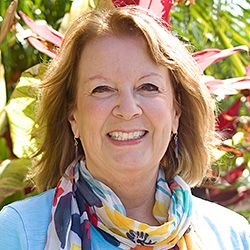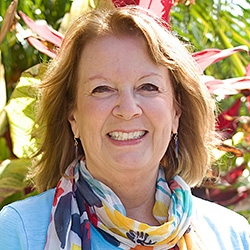

Search Results: compassion
-
Ask the Trainer: Can all needs be met when illness limits the capacity of one person to meet the needs of her partner?
-
Ask the Trainer: How do I respond to people who believe that consequences are necessary to change behavior?
-
In a recent vacation in a Mexican village, I was surprised to find myself in the midst of a community in mourning. Two days before I came, a 21-year-old girl had died in a car accident. Everyone in the town knew her and was openly affected by her death.
-
CNVC Certified Trainer Miki Kashtan talks with radio show host Hollis Polk about strategies for communicating with family members whose political views oppose our own.
-
In this stimulating audio recording, Stephanie Mattei covers several "hot" parenting topics such as: boundary issues, strategy resilience, how to shift your right/wrong mentality and understanding the concept of fairness. While unraveling these topics, Stephanie intersperses some practical neuroscience around brain regulation and brain-wise conflict prevention.
-
Join Jim Manske as he leads you through a self-connection exercise to guide you toward welcoming whatever enters into your awareness.
-
Jim and Jori share how gratitude helps them stay present, peaceful, and connected each day.
-
CNVC Certified Trainer Miki Kashtan helps a man whose ex-spouse reacted strongly to his attempt at empathizing with her. Miki shows us how it’s possible to hide behind our empathic expression, creating less rather than more connection. She suggests instead that we be vulnerably authentic.
-
Explore transforming prisons into places of healing to build safer, more connected communities.
-
Kathleen Macferran explores how deep listening can open doors and transform lives.
-
Listen to John talk about the inner and outer mediation process, the importance of the "3rd chair," and an experience of working with Pakistani elders.
-
Jeff Brown shows how to bring NVC to your workplace by starting with inner awareness.
-
Jeff Brown shows how connection requests invite authentic feedback and stronger workplace bonds.
-
The heart of the practice of nonviolence is a commitment to live through the powerful combination of compassion, fierceness, and courage, with an uncompromising willingness to stand for truth. Join Miki Kashtan for this exciting and informative course to learn how to practically embrace nonviolence.
-
Trainer Tip: We can voice our upset about a situation and still see the higher self in the other person. Honest expression can deepen connection and bring us closer to resolution and connection, when we're not judging them. To know that they're a spiritual being, but think they're an insensitive slob or egotistical bore, is a contradiction. Instead, look for the needs they want to meet. See the spiritual being in everyone—even yourself.
-
Explore how to apply NVC in workplaces like construction, even when openness seems limited.
-
Mary Mackenzie guides an exercise to deepen self-empathy and connect with your needs.
-
Miki Kashtan shares how to transform hidden fear mistaken for aggression into understanding.
-
CNVC Certified Trainer Miki Kashtan discusses how focusing on connection and care can guide us in expressing honestly and offering empathy.
-
This session is from the NVC Academy's 2017 Telethon. Listen in as Mary offers two experiential self-empathy exercises: I Love It When, and What Do I Want / Why Do I Want It. Deepen your ability to connect with self — novel and effective ways to engage the process of Self-Empathy!

Quick Links
Subscription Preferences
Stay In Touch!
Looking for ways to keep up with NVC Academy news, get special offers, free resources, or words of inspiration? Here are five ways to stay engaged:
















